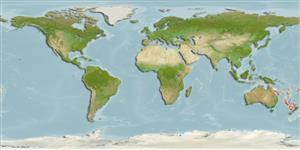>
Acropomatiformes (Oceanic basses) >
Malakichthyidae (Temperate ocean-basses)
Etymology: Malakichthys: Greek, malakia = softness + Greek, ichthys = fish (Ref. 45335); mochizuki: Named for Kenji Mochizuki (CBM)..
Environment: milieu / climate zone / depth range / distribution range
Ecología
marino batipelágico; rango de profundidad 300 - 360 m (Ref. 44351). Deep-water
Western Pacific: Australia.
Tamaño / Peso / Age
Maturity: Lm ? range ? - ? cm
Max length : 14.0 cm SL macho / no sexado; (Ref. 44351)
Short description
Morfología | Morfometría
Espinas anales 3; Radios blandos anales: 8. This species has no paired spines on the chin; proximal-middle radial of first anal-fin pterygiophore is curved with cone-shaped hollow divided by lamellar septum; undeveloped lateral wing; A III, 8; pectoral-fin rays 14; lateral line scales 50-52; gill rakers 23-25 on lower arm; 4-5 transverse scale rows above lateral line; body depth 26-31% SL (Ref. 76883).
Life cycle and mating behavior
Madurez | Reproducción | Puesta | Huevos | Fecundidad | Larva
Yamanoue, Y. and K. Matsuura, 2002. Descriptions of two new acropomatid species of the genus Malakichthys (Teleostei: Perciformes) from Australia. Bull. Mar. Sci. 69(3):1139-1147. (Ref. 44351)
IUCN Red List Status (Ref. 130435)
Threat to humans
Harmless
Human uses
Más información
Nombres comunesSinónimosMetabolismoDespredadoresEcotoxicologíaReproducciónMadurezPuestaAgregación para la puestaFecundidadHuevosEgg development
Age/SizeCrecimientoLength-weightLength-lengthLength-frequenciesMorfometríaMorfologíaLarvaDinámica larvariaReclutamientoAbundanciaBRUVS
ReferenciasAcuiculturaPerfil de acuiculturaRazasGenéticaElectrophoresesheritabilidadEnfermedadesProcesamientoNutrientsMass conversion
ColaboradoresImágenesStamps, Coins Misc.SonidosCiguateraVelocidadTipo de nataciónSuperficie branquialOtolitosCerebrosVisión
Herramientas
Special reports
Download XML
Fuentes de Internet
Estimates based on models
Preferred temperature (Ref.
123201): 7.7 - 17.4, mean 13 °C (based on 10 cells).
Phylogenetic diversity index (Ref.
82804): PD
50 = 0.5078 [Uniqueness, from 0.5 = low to 2.0 = high].
Bayesian length-weight: a=0.00479 (0.00182 - 0.01257), b=3.12 (2.89 - 3.35), in cm total length, based on LWR estimates for this (Sub)family-body shape (Ref.
93245).
Nivel trófico (Ref.
69278): 3.6 ±0.5 se; based on size and trophs of closest relatives
Resiliencia (Ref.
120179): Medio, población duplicada en un tiempo mínimo de 1.4-4.4 años (Assuming tmax>3).
Fishing Vulnerability (Ref.
59153): Low vulnerability (10 of 100).
